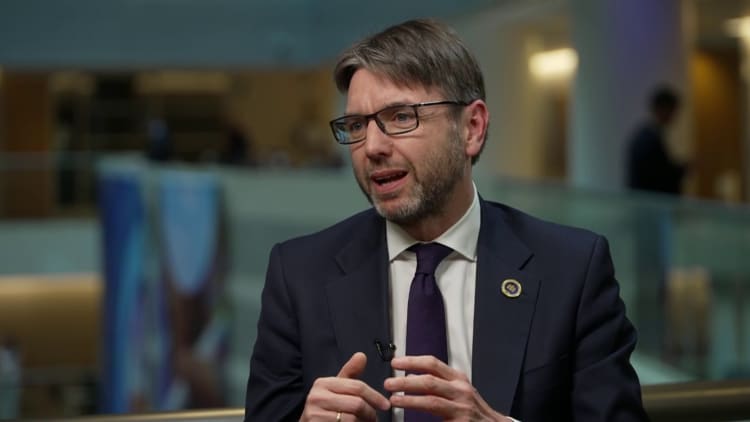

A senior Dutch government minister says he has confidence in the country’s coveted chip equipment maker ASML The company will remain in the Netherlands after it threatened to move operations abroad.
Dutch Finance Minister Steven van Weyenberg told CNBC’s Karen Tso on Thursday that he was not concerned about ASML’s statement threatening to leave the country. The company has since withdrawn those comments.
In a January conference call with investors, ASML Chief Executive Peter Wennink said: “The consequences of limiting labor immigration are huge, and we need these people to innovate. If we can’t get these people here, We will go where we can develop.
His comments come after the Netherlands proposed a controversial plan to scale back tax incentives for highly skilled immigrants and limit the number of foreigners who can attend Dutch universities.
ASML is at the heart of the global semiconductor supply chain. The company makes extreme ultraviolet lithography (EUV) machines, which are critical to the semiconductor industry for making integrated circuits.
EUV machines produce large amounts of very short wavelength light that can print small, complex designs on microchips. EUV light is produced by tiny explosions of molten tin at extremely fast speeds, then reflects off what ASML says is the flattest surface in the world.
“I think many people, many countries will welcome ASML, but I think they are deeply entrenched in the Netherlands,” Van Weyenberg told CNBC on Thursday.
The minister said he was involved in discussions last month between the cabinet and ASML about the company’s plans for growth in the Netherlands and whether there would be enough roads, housing and skilled personnel from abroad to facilitate such growth.
“I’m very optimistic about the future of ASML, and that it will be based in the Netherlands,” he said.
On June 16, 2023, the ASML logo appeared at the headquarters in Veldhoven, the Netherlands.
Piroschka Van De Wouw | Piroschka Van De Wouw Reuters
The Dutch government last month launched a campaign called “Operation Beethoven” to try to address ASML’s concerns and convince them to stay in the Netherlands. Reuters reports.
The semiconductor equipment maker has since ruled out leaving the Netherlands entirely, but the company remains dissatisfied with the way its home country promotes growth.
“There’s quite a gap between what industry is worried about, what we think is necessary and what politicians are thinking,” ASML Chief Executive Peter Wennink told reporters after a meeting with the Dutch government in March, according to Reuters. gap. He is reported to have said that if ASML cannot develop in the Netherlands, “it can develop elsewhere.”
While the Dutch are still working to appoint a new government, plans previously approved by parliament to limit the number of foreign students and eliminate tax breaks for skilled immigrants have rattled several businesses in the country, including ASML and Dutch chipmaker NXP ).
ASML has 23,000 employees in the Netherlands, more than 40% of whom are non-Dutch.
The Netherlands has previously seen some multinational companies abandon Dutch shores in search of wider space.Taking 2021 as an example, oil majors shell decided to move its corporate headquarters and tax base from Amsterdam to London.
at the same time, UnileverThe Anglo-Dutch consumer goods company in 2020 pushed ahead with plans to unify its headquarters in London, ending the company’s hybrid structure of dual headquarters in the UK and the Netherlands.
However, Britain’s high-growth tech companies have had their own complaints, including about how the government is encouraging foreign investment in tech startups and the hiring of foreign labor following the Brexit vote.
The “crown jewel” of the Dutch economy
ASML is also in trouble geopolitical Tensions between the United States and China. In January, the company was The Dutch government has banned the export of some tools to China.
The trade blockade comes after the U.S. government tightened export controls on China’s advanced semiconductor and chip manufacturing tools in October, building on previous rules.
Van Weyenberg said the Dutch government is working with ASML and the United States to impose chip export controls on China.
“ASML is one of the crown jewels of the Dutch economy,” Van Weyenberg said. “They are really one of the foundations of our growth model.”
“We want to support them, we actually help them grow in the Netherlands. I think they have a great future as well if they follow all the rules at the table,” he added.
But he also warned that the global fragmentation caused by the fractured world economy puts small open economies like the Netherlands at risk.
He added that from a security risk perspective, “we also have to look at China and make sure they follow the same rules.”







